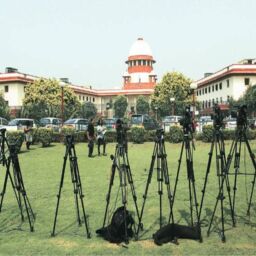Introduction
Under Article 20(3) of the Constitution of India, an accused has the right against self-incrimination, which could be said that a right to protect himself from stating such statements or remarks which may be proved as minacious or dangerous to his case against the prosecution. This very right was commonly known as the Latin maxim, ‘Nemon tenetur seipsum accusare’ during the regime of Roman church law. This means that “no person is obligated to blame himself”[1]. Also, it is obligatory that the accused be well-informed of these rights before making any statement that could be proved incriminating against his/her. Additionally, no force should be used to obtain such statements.
Third-Degree methods: A violative of right against self-incrimination under Article 20(3)
The third-degree methods are used by investigators or police as a truth machine for scientific interrogation to extort confessions. These are commonly known as Narco-Analysis, polygraph tests, and brain mapping that are used to elicit information that could be corroborative during the police investigation. The term Narco-analysis was derived from the Greek word narkç (or anaesthesia) that was used for diagnostic or psychotherapeutic purposes. Famous British Surgeon, Sir Victor Horsley is credited with its coinage[2]. In this, psychotropic drugs are introduced in the bloodstream to inhibit the mental faculty of an individual and resurfaces the suppressed motives and thoughts into reality. The practice of using such a technique against criminals for admitting their crime violates his/her fundamental right guaranteed under Article 20(3) of the Constitution. The said Article in clear words states, “No person accused of any offence shall be compelled to be a witness against himself”.
The Apex Court while questioning its admissibility, then, now, and ever again, has explicitly pronounced that “if an individual’s will is governed” or his confession is not “the product of rational intellect or free will”, then the acquired confession has no value before the court of law on the ground that it is attained by the help of coercion. Apart from this, it also intrudes or violates the mental privacy of an individual. Polygraphy Test, also known as the lie-detectors test, is generally used to determine the genuineness or falsity of an individual’s statements. It mainly measures physiological responses such as blood flow, blood pressure, pulse rate, or respiration. Its legality has always been examined on two grounds: firstly, associating physiological responses with truth and falsity of the statements, which is completely baseless, and secondly, physiological responses are used as a determining factor for truth and falsity of statements which is also not credible in a full sense due to their accuracy[3]. Brain mapping is one of the neuroscience techniques which analyses bandwidths and frequency of brainwaves. The said frequency is produced by attaching sensors to the suspect’s head, and if the suspect’s brain recognizes events or scenes from the crime scenes, it sends a different wave of frequency from the innocent person’s brain who has no knowledge of such events. The suspect is made to hear sounds and to see images from the crime scenes and different frequencies of signals are then recorded to determine the truth and falsity of the suspect’s confessions.[4]
Judicial determinations on the constitutionality of Third-degree methods
The supreme court of Canada in the famous case of Horvath v. Queen[5] reasoned that if involuntary or compelled statements are given more importance, then it will be at a playful advantage of investigators to resought to compellable methods such as coercion, threats, inducements, and deception for interrogation. Law must prohibit all means and methods which abhor the dignity, liberty, freedom, and bodily integrity of individuals on interrogation. The Supreme court of India in its locus classiscus case of Selvi v. the State of Karnataka[6] declared the unconstitutionality of such impugned techniques and enunciated that conducting such tests without the consent of the accused transgresses the circumference of the right of privacy, a right well – inducted under the right to life. Furthermore, the Court uttered that forcibly interfering with a person’s mental process is not protected by any statute of law. However, for the protection of criminal justice, and with the consent of the accused the voluntary administration of these techniques is safeguarded. But the results of such tests can never be admitted as evidence, even though consent is given. This is because of the person’s non-existence mental control over the responses. These replies are considered inadmissible under Section 27 of the Indian Evidence Act, 1872.
Instances where THE Court allowed narco-analysis, polygraph, and lie-detector
In Rojo George v. Deputy Superintendent of Police[7], the Kerala High Court allowed the narco-analysis test in the opinion that the criminals nowadays use sophisticated and modern techniques in committing crimes; thus, the traditional and conventional methods of interrogation are proved to be futile. Hence, it is necessary to replace these methods with modern techniques such as third-degree methods that may be considered efficacious.
In the case of KM. Seema Azad v. State of Uttar Pradesh[8], the police extorted the confession of accused, Vijay Sen who helped in the disappearance of the dead body of a law student Shashi in a murder case on command of key accused, Anand Sen. Based on his statements, extorted via narco-analysis, polygraph, and lie-detector, Anand Sen, then minister in UP cabinet was arrested, who continues to be in jail.
Constitutional and legal provisions determining the validity
Narco-analysis, polygraph test, brain-mapping, after construing various provisions of law, were declared ultra vires with the basic structure of the Constitution, and violative of the principle of natural justice. Its administration violates various fundamental rights enshrined under Article 20(3) (the right against self-incrimination) and Article 21 (the right to life and personal liberty). This includes the right to remain silent during the criminal investigation, as guaranteed in Nandini Sathpathy v. P.L.Dani[9]. This case clarified that forcible intrusion into a person’s mind via administering these tests violates the legitimacy of the right to silence enshrined under the Constitution.
Section 161(2) Code of Criminal procedure, 1973 in its words, “every person is bound to answer truthfully all questions, put to him by a police officer, other than questions the answers to which would tend to expose that person to a criminal charge, penalty or forfeiture” seeks protection from impugned techniques such as narco-analysis, polygraph, brain-mapping constituting mental torture, and violating the right to privacy. Last but not the least, an act of remaining silent upon the question of permission to conduct such a test does not imply voluntary consent under Section 27 of the Indian Evidence Act.
Conclusion
The criminal justice system of India adheres to the principle of natural justice, maintaining the liberty, integrity, and freedom of each individual. Though the utility of these tests provides information to investigative authority, helping in establishing motive, intention, and connecting missing links to constitute the corroborative evidence, it is unacceptable owing to the natural justice and rule of law. There is a presumption of innocence in the Indian court of justice that, ‘Every person is considered innocent until proven guilty’, and demands a certain degree of decency and morality while administrating justice. Thus, Narco-analysis, polygraph test, and brain mapping are unconstitutional in the eyes of the Court.
Author(s) Name: Rishika Singh (Amity University, Lucknow)
References:
[1] Akshat Mittal and Aakarsh Mishra, ‘Right against Self-Incrimination: A Detailed Study & Analysis of Laws Prevailing in India’(2021)4 (2) IJLMH <http://doi.one/10.1732/IJLMH.26425> accessed 7 January 2022
[2] Kuberinder Bajaj, ‘The Concept of Narco Analysis in the View of Constitutional and Human Rights’ (2018) 1(9) IJRESM <https://www.ijresm.com/Vol_1_2018/Vol1_Iss9_September18/IJRESM_19_99.pdf> accessed 7 January 2022
[3] Sanjay K singh, ‘Narco, Lie-detector test, Brain mapping illegal, rules SC’ The Economic Times (Delhi, 6 May 2010) <https://economictimes.indiatimes.com/news/politics-and-nation/narco-lie-detector-test-brain-mapping-illegal-rules-sc/articleshow/5896174.cms> accessed on 7 January 2022
[4] Sanjay K singh, ‘Narco, Lie-detector test, Brain mapping illegal, rules SC’ The Economic Times (Delhi, 6 May 2010) <https://economictimes.indiatimes.com/news/politics-and-nation/narco-lie-detector-test-brain-mapping-illegal-rules-sc/articleshow/5896174.cms> accessed on 7 January 2022
[5] (1979) 2 S.C.R. 376
[6] (2010) 7 SCC 263
[7] 2006 (2) KLT 197
[8] 2013 SCC OnLine All. 2858
[9] 1978 SCR (3) 608
















